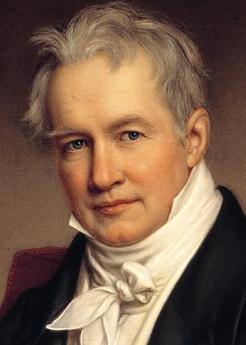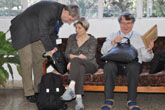SCIENTIFIC PROGRAMME
| Wednesday, Feb. 2, 2011 | |
| 12:00 --- | Registration |
| 13:00-14:00 | Lunch |
| 14:00-16:00 | Presentation by the Alexander von Humboldt (AvH) Foundation |
| 16:00-16:30 | Coffee Break | Inaugural programme |
| 17:00-17:20 | Inauguration |
| 17:20-17:30 | Introduction of the Keynote Speaker Vidyanand Nanjundiah |
| 17:30-18:30 | Keynote Address Pattern formation in Biology: local self-enhancement and long range inhibition as the driving force. Hans Meinhardt, Max Planck Institute for Developmental Biology, Tübingen, Germany |
| Thursday, Feb. 3, 2011 | |
Session 1: Self-Organization in Chemical Systems |
|
Chair: V. Chandrasekhar |
|
| 09:00-09:30 |
Contribution to the origin of condensed matter H. W. Roesky, Institute of Inorganic Chemistry, University of Gottingen, Germany |
| 09:30:10:00 |
From molecule to crystal: The problem of crystal engineering G. R. Desiraju, Solid State and Structural Chemistry Unit, Indian Institute of Science, Bangalore, India |
| 10:00-10:30 |
Chemistry of the Thyroid Gland: Thyroid Hormones and Antithyroid Drugs G. Mugesh, Dept. of Inorganic & Physical Chemistry, Indian Institute of Science, Bangalore, India |
| 10:30-11:00 |
Biotin Self-organization: Making and Machining of Soft Structures and Modification of Human RBCs S. Verma, Department of Chemistry, IIT, Kanpur, India |
| 11:00-11:30 | Coffee Break |
Session 2: Self-Organization in Biological Systems |
|
Chair: H. Meinhardt |
|
| 11:30-12:00 | Biological complexes- structure & function U. Heinemann, Max Delbrueck Centre for Molecular Medicine, Berlin, Germany |
| 12:00-12:30 | Collective dynamics of coupled cells Somdatta Sinha, Centre for Cellular & Molecular Biology,Hyderabad, INDIA |
| 12:30-13:00 | Accessing transcriptome without cDNA library: Implications in tissue and cell engineering Sher Ali, National Institute of Immunology, New Delhi, India |
| 13:00-14:00 | Lunch |
Chair: U. Heinemann |
|
| 14:00-14:30 | Phylogenetic Trees and Networks -- Tools for Coping with Evolution and Biodiversity A. Dress, Department of Combinatorics and Geometry (DCG), Shanghai, China |
| 14:30-15:00 | Complexity in gene promoters and their expression M. Bansal, Molecular Biophysics Unit, Indian Institute of Science Bangalore, India |
| 15:00-15:30 | Self-organization and social behaviour in the cellular slime moulds Vidyanand Nanjundiah, Indian Institute of Science, Bangalore, India |
| 15:30-16:00 | Tea Break (Group Photograph) |
| 16:00-16:30 | Network of Networks: an Approach to the Climate System J. Kurths, Potsdam Institute for Climate Impact Research, Germany |
| 16:30-17:30 | Contributed Sessions (In parallel) |
|
| 17:45-18:45 | Evening Lecture: Chair V. Gaur Hydrodynamics of the Cumulus Clouds Roddam Narasimha, JNCASR, Bangalore |
| Friday, Feb. 4, 2011 | |
Session 3: Self-Organization in Physical Systems |
|
Chair: A. R. Choudhuri |
|
| 09:00-09:30 | Planetary Dynamos U. Christensen, Max Planck Institute for Solar System Research, Lindau, Germany |
| 09:30-10:00 | Earthquakes as self-organized critical phenomena V. Gaur, Indian Institute of Astrophysics, Bangalore, India |
| 10:00-10:30 | Complex dynamics with threshold: SOC, generalized epidemic and percola
tion processes P. Blanchard, Fakultät für Physik, Universität Bielefeld, Germany |
| 10:30-11:00 | Coffee Break |
Chair: Shriram Ramaswamy |
|
| 11:00-11:30 | Double diffusive convection in planetary cores A. Manglik, National Geophysical research Institute, Hyderabad, India |
| 11:30-12:00 | The Hydraulic Jump R. Govindarajan, JNCAR, Bangalore, India |
| 12:00-12:15 | STDP driven self-organization of neuronal network Kiran Kolwankar, Ramniranjan Jhunjunwala College, Mumbai, India |
| 12:15-13:30 | Lunch |
| Session 4: Complexity and emergent properties at the chemistry-biology-physics interface | |
Chair: Satyajit Mayor |
|
| 13:30-14:00 | Phase Transitions towards Self-Organized Criticality in Neuronal Systems T. Geisel, Max-Planck-Institute for Dynamics and Self-Organization, Göttingen, Germany |
| 14:00-14:30 | 1/f noise as a probe of organization
in networked liquids R. Ramaswamy, Department of Physical Sciences, Jawaharlal Nehru University, New Delhi, India |
| 14:30-15:00 | Modelling properties of protein-solvent systems J. Pleiss, Inst of Technical Biochemistry, University of Stuttgart, Stuttgart, Germany |
| 15:00-15:30 | Tea Break |
| 15:30-16:00 | A link between theoretical chemistry and astronomy S. Mahapatra, School of Chemistry, University of Hyderabad, Hyderabad, India |
| 16:00-16:30 | Studies on the regulation of and by miRNAs S. Bandopadhyay, Indian Statistical Institute, Kolkata, India |
| 17:00-18:00 | Meeting of the Humboldt Associations of India |
| Saturday, Feb. 5, 2011 | |
Session 5: Dynamics of Complex Systems |
|
Chair: U. Christensen |
|
| 09:00-09:30 | Power law tails in velocity correlations in a non-equilibrium statistical mechanical system V. Balakrishnan, Dept. of Physics, Indian Institute of Technology, Chennai, India |
| 09:30-10:00 | Dynamical Processes in the Atmosphere of the Sun S. S. Hasan, Indian Institute of Astrophysics, Bangalore, India |
| 10:00-10:30 | Relaxed configurations of gravitating systems Arun Mangalam, IIA, Bangalore, India |
| 10:30-11:00 | Coffee Break |
Session 6: Self-organization in Social Systems and Linguistics |
|
Chair: M.G. Narasimhan |
|
| 11:00-11:30 | Complexity, Emergence and the Mind R. Kasturirangan, National Institute of Advanced Study, Bangalore, India |
| 11:30-12:00 | Common Sense, Reason and Rationality in Politics - Order versus System B. Subramanian, Centre of German Studies, Jawaharlal Nehru University, New Delhi, India |
| 12:00-12:30 | Patterns in sequences: biology, language, music R. Siddharthan, IMSc, Chennai |
| 12:30-12:45 | Markov Chain model for the Indus script R. Adhikari, IMSc, CHennai |
| 12:45-13:00 | Concluding remarks S. S. Hasan |
| 13:00 | Lunch |

